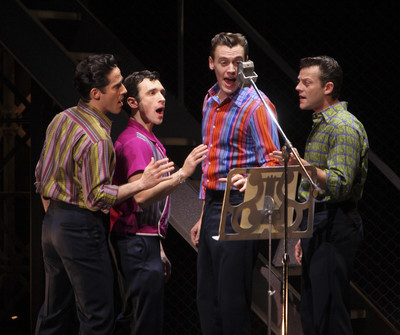Four versions of Seasons’ saga told

Early on in “Jersey Boys,” there’s a shout-out to New Jersey and a built-in pause that gives home-staters an anticipated chance to hoot and holler.
In the second act, there’s a plot turn that brings up Las Vegas, and only the faintest snicker of reaction to the home turf of the Palazzo’s new production.
Why? By then, the audience is deeply caught up in the drama of a tense scene. You read that right: the drama of a tense scene, in a Broadway musical on a Las Vegas stage (the musical celebrated its formal debut Saturday, after a month of full-priced previews).
It might stand out more on the Strip, but the absorbing story that propels this musical biography of Frankie Valli and The Four Seasons has surprised audiences around the country. Those who expect perhaps a “Forever Plaid”-style revue get a crackling, cinematic staging of a saga so messy it can only be true.
Or at least true to the diverse viewpoints of the four original Seasons, who each narrate one metaphoric “season” of the group’s history. The first, Tommy DeVito (Jeremy Kushnier), tells you up front that if you ask four different guys, “you get four different versions.”
Director Des McAnuff shaped the 2005 Broadway hit with writers Rick Elice and Marshall Brickman, who was Woody Allen’s co-screenwriter on “Manhattan” and “Annie Hall.” They’ve deftly meshed the group’s complicated history with its song catalog. More often than not, hits such as “Bye Bye Baby” are interrupted by dialogue, fading into background to underscore the action. When a song such as “My Eyes Adored You” does break out, “Mamma Mia!” style, as the emotional expression of traditional show tuneage, the impact is more effective for its rarity.
The first act charts DeVito’s attempts to steer a fledgling group through the third of three options for climbing out of a tough neighborhood: “Join the Army, get mobbed up or become a star.” First he and musical partner Nick Massi (Jeff Leibow) recognize “the raw clay” of young Valli (Rick Faugno), and tutor him between revolving-door jail stretches for petty burglaries.
The group slogs its way through dive bars and bowling alleys until it meets Bob Gaudio (Erich Bergen), a teen songwriting prodigy who explains to the audience that he already was a one-hit wonder at age 17, having penned the immortal “(Who Wears) Short Shorts.” The quartet teams up with flamboyant producer Bob Crewe (John Salvatore) and slowly but surely makes magic: The slow wind-up doesn’t deliver the first Four Seasons hit “Sherry” until the 50-minute mark, and by then the audience is ready to cheer the triumph.
The writers follow the predictable band-makes-good road map, with the musical often compared to a VH1 “Behind the Music.” They also occasionally oversimplify in the name of dramaturgy.
(How is it Gaudio knows Crewe? And if he does, why do he and Valli waste time knocking on other doors?)
But for the most part, they don’t deny the inconvenient detours, such as Valli’s neglected first wife (Joyce Chittick), to take a more formulaic approach.
The realistic tone readies the audience for the “winter” of the tale: “Some achieve greatness and (screw) it up,” Valli tells the audience. The group’s power structure shifts to Gaudio and DeVito becomes more reckless with its finances, until the group must appeal to New Jersey’s godfather, Gyp DeCarlo (Ken Krugman) to negotiate a path out of debts to a loan shark and the IRS.
McAnuff’s breakneck direction navigates the twisty road with characters wheeling their own props onto a sparse set of scaffolding, which is occasionally adorned by Roy Lichtenstein-style pop art projections. In his low register, Faugno isn’t the vocal dead ringer for Valli of Broadway original John Lloyd Young, but he captures the bottled-up intensity of a singer who finds success but never a home. As Gaudio, Bergen does a fine job aging from virginal teen to group mastermind.
By the time Las Vegas is again invoked at the end, the reference by the DeVito character (the real one does live here) gets a big laugh. “Jersey Boys” might be gritty, but it’s a crowd-pleaser at heart.
Some anxious fans have wondered whether and how much the musical would be cut for Las Vegas. The answer seems to be, imperceptibly, if at all. Did the character of Joe Pesci (yes, the actor) get more stage time on Broadway? Or is his presence such a surprise that it fools the memory?
As for the big issue of whether it would have an intermission, the answer is an eight-minute “short break,” counted down on the video screens. This one needs work, given the confusing layout of the lobby and the restroom lines. Would two more minutes kill the Palazzo’s casino action?
Also annoying is this brand-new theater stacking twin speaker columns to the sides of the stage, ’70s rock-concert style. Not only does this blow back the hair of people sitting in front of them, but it ruins the intended spatial sound effect of having live drums and band sounds come right off the set.
The show overcomes these weird choices, but the audience shouldn’t have to.
Contact entertainment writer Mike Weatherford at 702-383-0288 or e-mail him at mweatherford@reviewjournal.com.